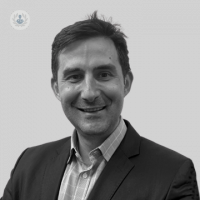Recovery after complex spinal surgery
Written in association with:Recovering after a complex spinal operation can feel overwhelming, but knowing what to expect during the healing process can help ease concerns. While every patient’s recovery journey is unique, understanding the general timeline, pain management strategies, and warning signs can make this period smoother.
We speak to leading spinal surgeon Mr Gordan Grahovac, who explores some key aspects of recovery, so you can feel more prepared for the weeks and months ahead.

What can I expect immediately after a complex spinal operation?
Recovering after a complex spinal operation is a journey that requires patience and care. The first few days post-surgery are critical as your body begins the healing process. Immediately after the operation, you will be moved to a recovery area where your vital signs—such as heart rate, breathing, and blood pressure—will be closely monitored. It is normal to experience some discomfort and pain at this stage, but you will be provided with appropriate pain relief.
You may have drainage tubes near the surgical site to prevent fluid build-up.. If you've had extensive surgery, it is likely that you will spend the first 24 hours in an intensive care setting to ensure everything is stabilising as expected.
How should I manage my pain after surgery?
Pain is a natural part of recovery following spinal surgery. However, your healthcare team will work with you to manage it effectively. You will likely receive a combination of medications, including analgesics (painkillers) and anti-inflammatory drugs. These medications are designed to reduce pain while minimising side effects.
In the days following surgery, as your body begins to heal, the level of discomfort should gradually decrease. Make sure to follow your doctor’s advice on taking regular pain medication and don’t hesitate to inform them if your pain becomes difficult to manage.
When can I start moving again?
Movement is an essential part of your recovery, but it must be approached carefully to protect your spine. In the first day or two after surgery, a physiotherapist will guide and teach you how to move safely. You will be be able to sit up, stand, or even walk with assistance immediately after surgery.
Your physiotherapist will show you specific movements and exercises that will prevent stiffness and promote healing. It is critical to follow their advice and avoid any movements that could strain your spine, such as bending, twisting and heavy lifting.
How can I support my recovery at home?
Once you are discharged, your focus should be on allowing your body to heal while gradually regaining mobility. Home modifications, such as adding grab rails in the bathroom or using a raised toilet seat, can make daily activities easier and safer.
Make sure to follow your surgeon’s instructions regarding wound care, medication, and activity levels. It is crucial to avoid heavy lifting, strenuous activity, or any sudden movements that could affect the healing spine. Follow-up appointments will monitor your progress, and your doctor may schedule imaging tests to assess how your spine is healing internally.
What warning signs should I watch for?
While most people recover without complications, there are some warning signs to be aware of. Notify your healthcare provider if you experience any of the following:
- Severe or increasing pain.
- Fever, which could indicate an infection.
- Redness, swelling, or discharge around the wound site.
- Difficulty controlling your bladder or bowels.
- Numbness or weakness in your arms or legs.
Catching potential problems early can prevent more serious issues from developing, so it’s essential to keep an eye on your symptoms and communicate openly with your medical team.
If you would like to book a consultation with Mr Grahovac, simply visit his Top Doctors profile today.


